If you fill out the "Forgot Password" form but don't get an email to reset your password within 5-10 minutes, please email logistics@ire.org for assistance.
Investigative Reporters and Editors is honored to announce that Tristan Ahtone will give the keynote address for AccessFest24, the organization's fourth virtual-by-design conference Oct. 17-19.
Ahtone serves as Editor at Large at Grist, a nonprofit, independent media organization focused on climate solutions and environmental injustice. He will join in conversation with ProPublica reporter and IRE Board member Mary Hudetz.
Ahtone is an award-winning reporter, who previously served as Editor in Chief at the Texas Observer and Indigenous Affairs Editor at High Country News. He is a member of the Kiowa Tribe, most recently recognized by Covering Climate Now for his leadership on Grist’s “Misplaced Trust” investigation.
Hudetz is an award-winning reporter at ProPublica, based in Albuquerque. She is an enrolled member of the Apsaalooke/Crow Tribe and focuses on investigating tribal issues throughout the Southwest. This year, Hudetz was honored with the Richard LaCourse Award for Investigative Journalism for her work on ProPublica’s “The Repatriation Project.” She was elected to the IRE Board of Directors in June.
“Their experiences and expertise will foster an important conversation at AccessFest24”, IRE Director of Diversity & Inclusion Francisco Vara-Orta said. Both Ahtone and Hudetz are also former presidents of the Indigenous Journalists Association.
“Both of them have been leaders in our journalism community,” Vara-Orta said. “For IRE members to hear from them is really crucial for us to continue to better report on historically marginalized communities — especially in the weeks leading up to an election, amid polarization and disinformation about communities that have not normally had a voice in mainstream media.”
The conference is centered around belonging, equity, and inclusion both in news coverage and within the newsroom. While the IRE and NICAR Conferences have some sessions on these topics, AccessFest allows journalists to dive deeper. The conference started out as the “DBEI Symposium” in 2021 and was rebranded as AccessFest last year.
The previous conferences have highlighted Black, Asian and Latino voices in the keynote conversation, including Anzio Williams of NBCUniversal, Sisi Wei of The Markup and Maria Hinojosa of Futuro Media.
“On the path to greater representation, we must center Indigenous voices,” Vara-Orta said. “It's critical that IRE includes as many voices and perspectives as possible.”
Another AccessFest highlight is the opportunity for attendees to get IRE’s more traditional investigative and data training — from anywhere in the world — at a fraction of the cost of the in-person conferences.
AccessFest24 will be held online Oct. 17-19. Get additional details and register for the conference here.
(May 21, 2024) — The IRE Conference has some key moments each year: classes taught by the best and brightest in journalism, the Thursday night Welcome Reception, and of course, the inspirational IRE Awards Luncheon.
It’s a decades-old tradition, but we’re always looking for ways to improve our programming and keep up with trends in the industry.
Here are some new things we’re looking forward to at IRE24!
The IRE Conference hasn’t been to California since 2014. A decade later, we’re excited to bring the world’s largest gathering of investigative journalists to the west coast!
The new “FYI Forum” will feature conversations centered on journalists’ advice and lessons learned. Whether you’re looking for project funding, ways to fight news fatigue or hoping to start an investigative team in your newsroom, stop by an FYI Forum and get practical tips to navigate the industry and your career.
This year’s conference will have a track focused on “gender and reproductive rights” for the first time. With growing news coverage of changing abortion laws, trans rights and gender identity, journalists can get guidance on these topics at IRE24.
Sessions on this track include:
*planned in partnership with Trans Journalists Association
Join the ongoing debate on AI at IRE24. We’ll have sessions on the broader concerns on AI — from copyright issues to audio deepfakes — and how to report on them. Plus, helpful ways these emerging technologies can make your job easier.
Sessions on this track include:
Master Classes are a conference staple. IRE24 will have the usual favorites, as well as new classes focused on FOI denials and storytelling.
“FOI Frenzy: Psychological Strategies For Getting Records Out Of Their Grubbies” will give you tactics for eliminating copy fees, effective wording for request letters, principled negotiation strategies and more. Dave Cuillier, of the Brechner Center, will teach this class.
Ken Armstrong, of Propublica, is back at IRE24 to teach “Reporting and writing for scene.” This class will look at ways to gather dialogue and detail — while being emotionally and factually correct.
These classes have limited seating and require pre-registration. See the full list of Master Classes here.
In six different "Deep Dive" sessions, the country’s top journalists will have in-depth, candid conversations on the biggest topics in investigative journalism today. No PowerPoints. No frills. Just talking. The sessions are:
IRE partnered with Alaska Airlines, Delta Air Lines and Southwest Airlines this year, thanks to the IRE Board’s Affordability Task Force. Conference attendees can now get discounts on air travel, as well as ground transportation discounts.
IRE members can also find a roommate to save money on hotel costs.
We received hundreds of brilliant pitches from IRE members on panel ideas. Here are (just a few) new sessions that are being taught in person for the first time.
Check out the full conference schedule here.
If you want to hang out after conference sessions, away from happy hours, we’ll have a room dedicated to board games on Thursday! Similar to NICAR24, we’ll have some games on site, but feel free to bring your own, too. All are welcome.
IRE24 will take place June 20-23 in Anaheim, California. Learn more about the conference here.
(May 15, 2024) — Journalists wear many hats in the newsroom these days, but it’s not often that they’re international diplomats, too.
John Bones was a rare global ambassador in the field, advocating for cultural exchange and cross-country collaborations in journalism.
Bones died May 13 in Oslo, Norway, at the age of 69.
“John brought Norwegian journalism to the world - and took the world home with him,” SKUP, the Norwegian Foundation for Investigative Journalism, wrote in memoriam.
Bones, who served as general manager at SKUP, was a pioneer in the industry and a longtime champion of IRE. He taught classes at many IRE and NICAR conferences over the last two decades, and regularly brought groups of journalists from Norway to train at NICAR.
The IRE community is saddened by the news of his passing.
“A huge loss for journalists from many nations,” longtime IRE speaker Paul Overberg shared online.
“A lovely human and terrific investigative journalist. I will miss seeing him at IRE,” former IRE Board President Cheryl W. Thompson wrote.
IRE Executive Director Diana Fuentes remembers exchanging emails with Bones just last month. After being diagnosed with cancer last year, he said he had hoped to be back at work this summer.
“John was one of the finest gentlemen I have ever known,” Fuentes said. “A kind and welcoming person who enjoyed helping others, he embodied the very spirit of IRE.”
Doug Haddix, IRE’s former Executive Director, got to see that hospitality on display in Bones’ home country. When he and his family visited Norway in 2012, Bones led them on a walking tour of Oslo, including a visit to the Verdens Gang AS newspaper.
“John was just beaming the whole time because I'm not sure how many of his IRE friends were ever able to visit him in Oslo,” Haddix said. “But he was very proud and very gracious to be hosting us there.”
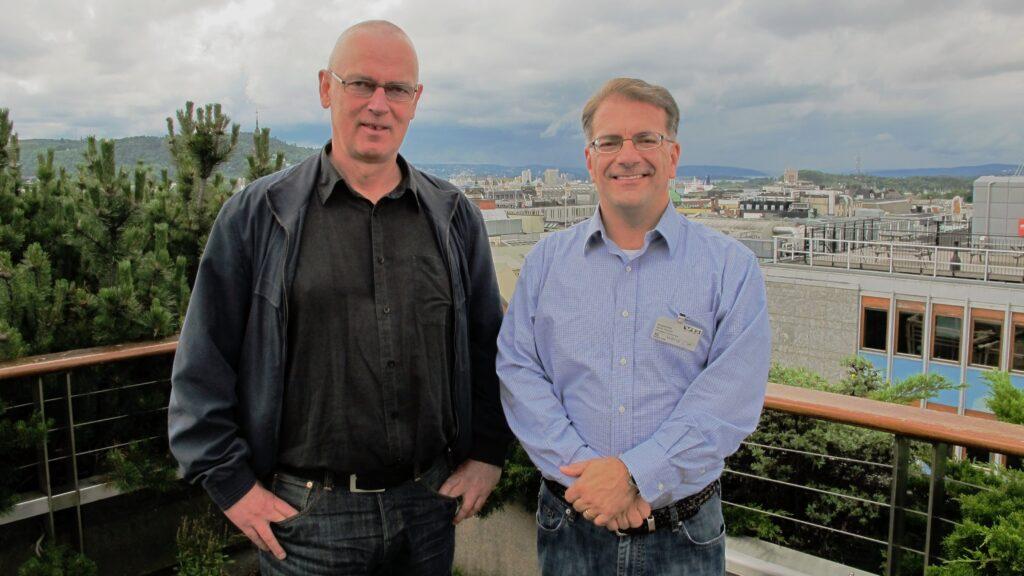
That cultural exchange was at the heart of Bones’ work as a journalism leader and mentor. He was passionate about engaging IRE’s global membership, often organizing groups of 10-15 journalists and bringing them to NICAR conferences.
He acted almost like a “tour guide,” Haddix remembers, setting up meetings and visits for them at news organizations in New York and Washington, D.C.
“He wanted to make sure that they experienced more than a conference,” Haddix said. “He wanted them to see what working journalists in the United States were dealing with and what they might learn from them, and vice versa. It was always mutual.”
Today, as the industry and the world around us evolve, journalists have plenty to take away from his example.
Bones worked in different types of media and recognized the power of technology. He was generous with his time and wisdom, helping to grow IRE, GIJN and others.
“One of John's main legacies will be for people to always adapt, and to never be comfortable and get into a rut,” Haddix said. “He loved learning new things.”
Beyond his excellence in journalism, Bones was a true ambassador for cross-border collaboration. He was “a man of the world,” his colleagues at SKUP write, with “friends on every continent.”
“John brought out the best in people, celebrating all kinds of cultures and putting everyone at ease with his ready smile,” Fuentes said. “He will be missed very much.”
Bones is survived by five children. Details about services are pending.
Investigative journalist Eric Eyre led the way in exposing the opioid crisis in rural West Virginia.
He’s won multiple awards: The field’s top honor, the Pulitzer Prize. An IRE Medal. A National Headliner Award. Most recently, in 2021, the IRE Book Award.
And he still finds value in being an IRE member.
“I still use the tipsheets,” Eyre said. “I tell people, before they launch into a project or a story, to look back (at the IRE Resource Center). … I know for the series on opioids that I did, I used that to see what had already been done, so I didn't duplicate what had been done (and) get an idea of things that worked, didn’t work.”
That trove of knowledge is at the heart of our organization.
For nearly 50 years, IRE members have been sharing wisdom and exchanging tips of the trade. At conferences. In webinars. At hotel bars and coffee shops (we’re journalists, after all).
We believe this collaborative spirit is vital not only for our industry, but our communities, too. With misinformation on the rise, democracy under threat and cutbacks in the news business, the world needs strong watchdog journalism now more than ever.
That’s why we’re committed to helping journalists stay successful in the field. This spring, IRE is offering a 10% membership discount to all new and lapsed members. Current members can also take advantage of the discount and renew their memberships at the lower rate. The promotion is available Monday, April 15 through Friday, May 3.
“Our world is always changing, and our jobs and this industry are evolving every day,” IRE Board Vice President Josh Hinkle said. “So what you'll see at the conferences, and what you'll see with upcoming webinars and workshops that we're offering, is that we're always refreshing the curriculum.”
Whether you’re just entering the field or you’ve been around a while, IRE has membership benefits that extend beyond an annual conference.
Our monthly webinars teach reporting advice on specific topics — like recycling and reproductive rights — storytelling techniques, public documents, elections coverage and more. They are available to members across the world for free.
The IRE Resource Center’s tipsheets, compiled and shared by hundreds of journalists over the years, offer guidance on investigative reporting techniques. If you have a question, there’s probably a tipsheet with an answer, IRE member Arya Sundaram says.
“There's a bazillion tipsheets,” Sundaram said. “It feels like you're given reporting notebooks … and the inner brains of these insanely talented journalists from decades past. That kind of knowledge is really incredible, and I am very grateful to be able to tap into it at a moment's notice when I need to.”
Sundaram, a journalist at WNYC and Gothamist, most recently credited IRE with helping her tell a story about changing migrant demographics in New York. A class at the 2024 NICAR Conference, “Regular Expressions,” taught her to clean and analyze “messy” entries in an academic database — on deadline.
“This stuff takes time, trying to dig through it,” Sundaram said. “Just being able to expedite that process was awesome.”
IRE Board President Brian Rosenthal shared a similar story of IRE helping him in a pinch.
“I’m doing a Sun shift and on a breaking story involving military,” he wrote on X in 2019. “I’ve never covered the military. So I went to IRE and found a tipsheet with contacts - including cell numbers. Just called one and got a response immediately. I love IRE.”
In addition to tipsheets, the IRE Resource Center has audio recordings of past conference sessions and video recordings of webinars. We also have a record of contest entries, so you can see how journalists put together their investigations.
IRE members get free access to tools such as Cometdocs and Tableau, as well as discounted access to SmartProcure/GovSpend and PacerMonitor. Our quarterly magazine, The IRE Journal, documents the latest trends in investigative journalism and goes out to members for free.
It’s all part of our mission to support and uplift investigative journalism — and you don’t need to have “investigative” in your title to join.
Decades before he was a Pulitzer Prize-winning journalist, Eyre was a daily reporter in rural Alabama. It was a fellow colleague, Mike Dorning, who lent him the “The Reporter’s Handbook,” by IRE, and got him “hooked” on investigative journalism.
Eyre still has the book. He says Dorning, who’s now at Bloomberg, never asked for it back.
“That's the kind of person Mike is,” Eyre said. “He’s very generous.”
That story encompasses the spirit of IRE, journalists helping one another out and wanting each other to succeed.
Learn more about IRE and the benefits of membership here.
NICAR24 was like a homecoming for St. Louis data journalist Janelle O’Dea.
“It’s one of my favorite weekends of the year,” O’Dea said. “If I'm around other journalists when I say that, they're like, ‘Wow, you're such a nerd.’ And I'm like, ‘Yes I am. Proud to be!’”
This conference was especially meaningful because it was her 10th NICAR, O’Dea explained to her nail artist a day before flying out to Baltimore. She showed a photo of the NICAR24 t-shirt, designed by Realtor.com's Evan Wyloge, and talked about how the organization helped kick start her career.
Nail artist Heather Young took it from there.
“She just understood the assignment so quick,” O’Dea said.
O’Dea went to her first NICAR Conference in 2014, as a college senior at the University of Illinois. That conference, which also took place in Baltimore, introduced her to a new world and new way of thinking.
“I barely knew what data journalism was at that point, but after I went to that NICAR, I was like, this is definitely what I want to do,” O’Dea said. “I basically said to myself, ‘I don't totally understand all the conversations that are happening around me, but I'm gonna hang out here for as long as it takes me to figure it out.’ And that’s kind of what I did.”
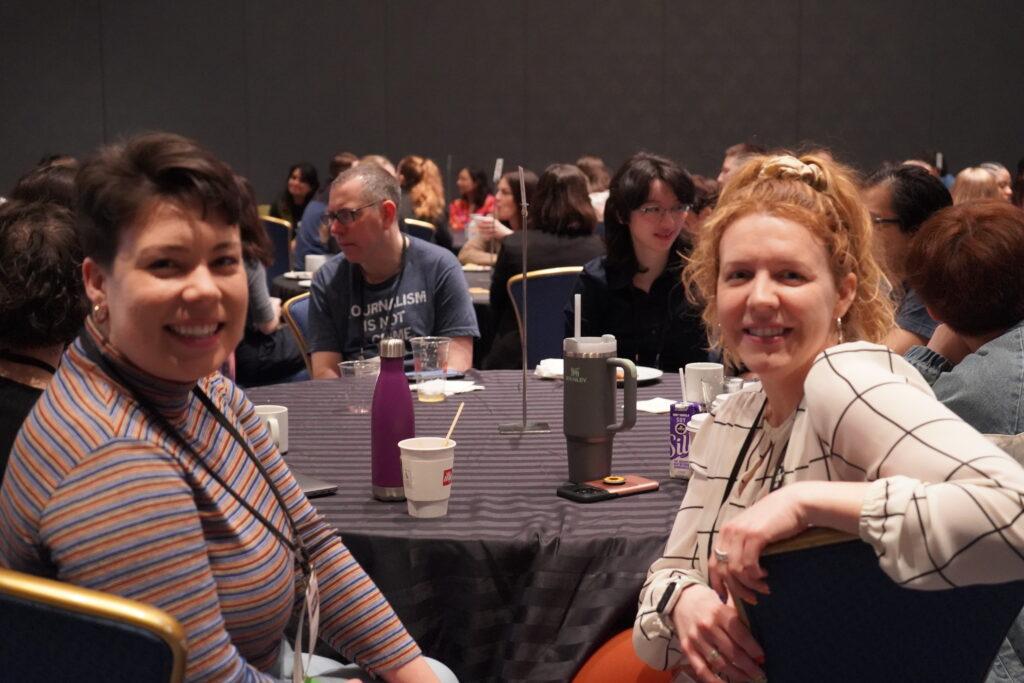
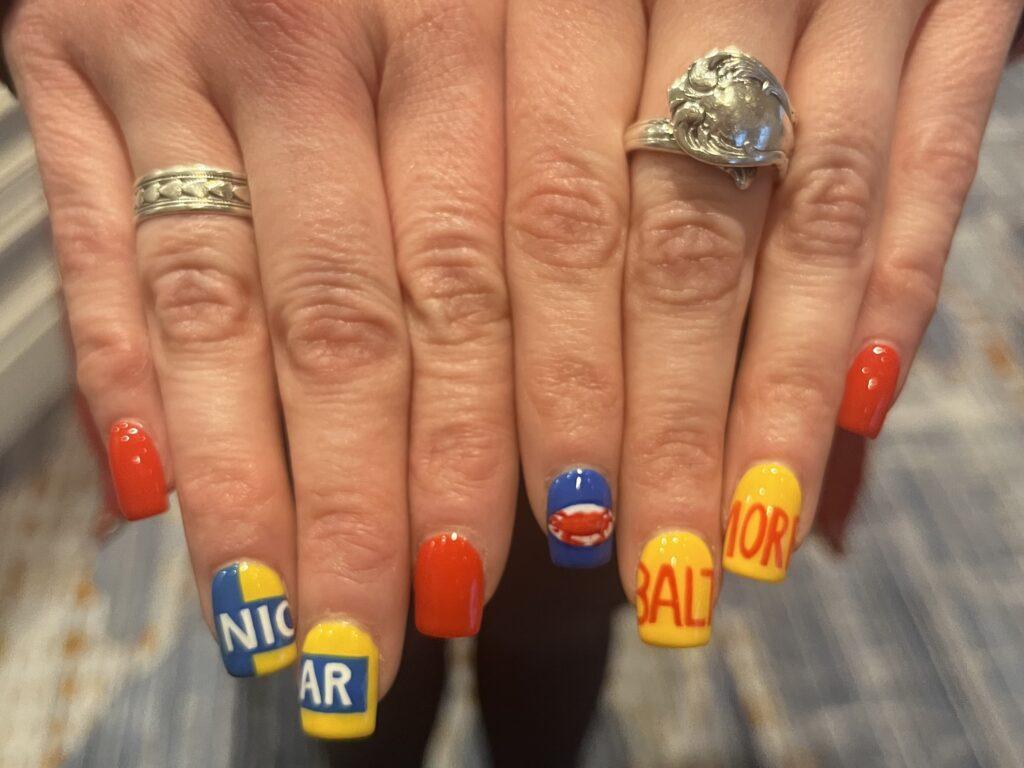
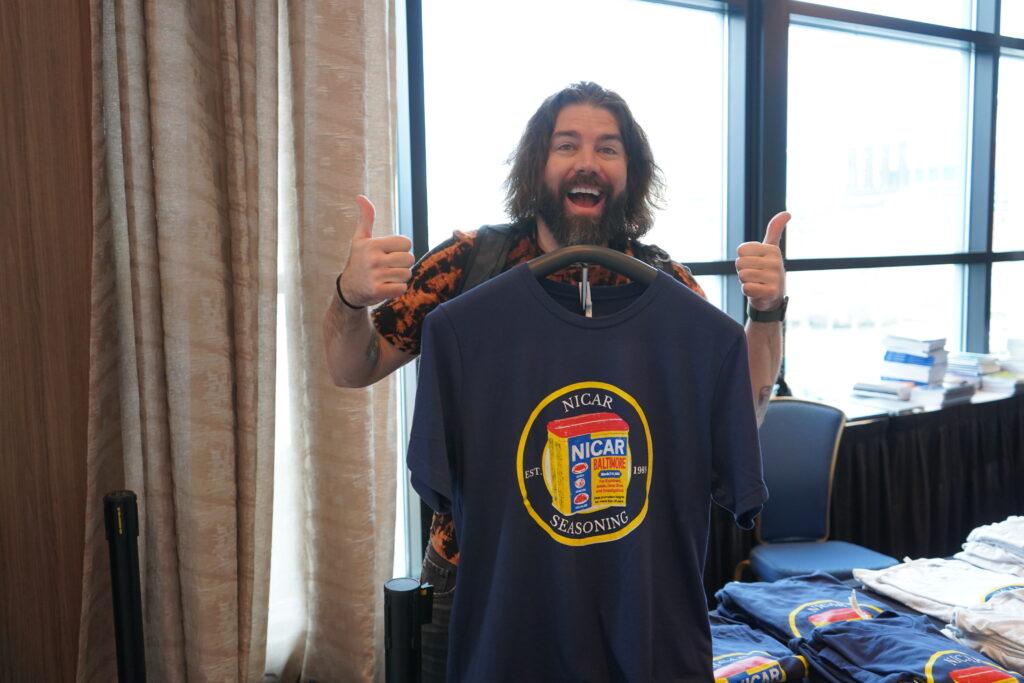
That’s a common theme at NICAR. People come back year after year to grow their skills and share what they know with others.
Some students turn into teachers — like Katherine Oung, who taught other student journalists how to build a data desk at their school publication. And Emilia Ruzicka, who spoke on four panels at NICAR24, just four years after attending their first conference!
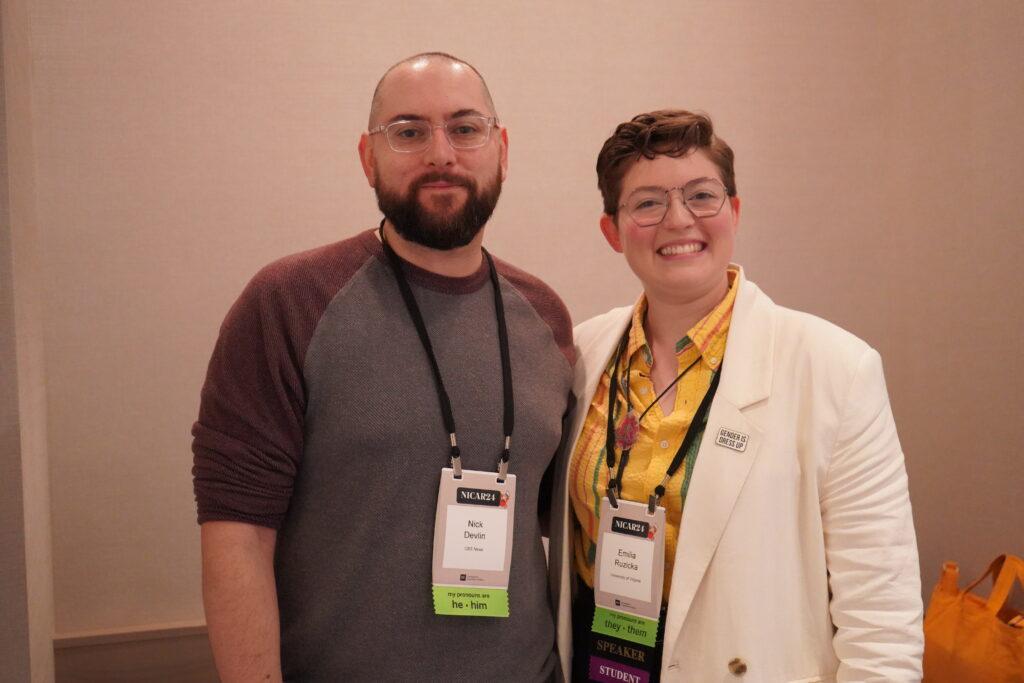
Then there are journalists who show up with new family members — like IRE board president Brian Rosenthal, who got married last year and attended NICAR24 with his wife Millie Tran. And Andrea Suozzo, who got a visit from her little one after teaching “First Python notebook!”
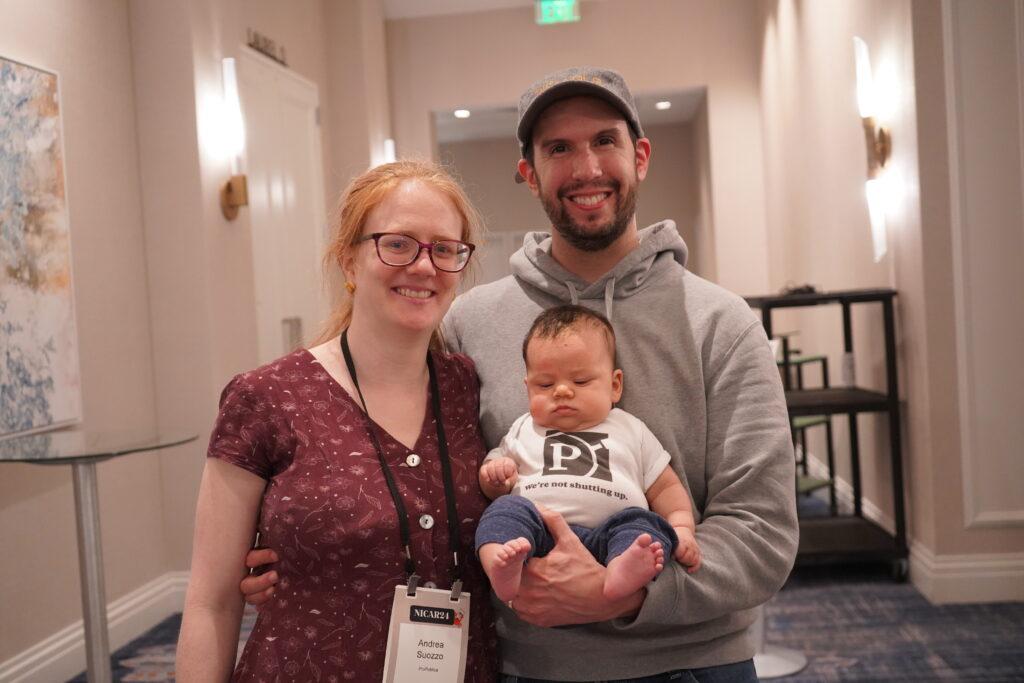
Whether you’ve changed jobs, switched beats or moved cities, NICAR is a special place to see our community members grow professionally and personally.
“NICAR fits into that bucket of friendships that you call your chosen family,” said Lauren Grandestaff, IRE’s director of content. “And it is such a close-knit community, but a lot of us only see each other once a year at best. So it does have a family reunion type of vibe to it.”
This is a group that sticks together during tough times, too.
Wall Street Journal reporters passed out “Free Evan Now” stickers to support their colleague Evan Gershkovich, who has been detained in Russia for the last year. Friends and colleagues gathered to remember Fazil Khan, a New York City journalist who died in a tragic fire just weeks before the conference.
Meanwhile, many people are coping with what feels like nonstop news of layoffs, cutbacks and closures in 2024. NICAR hosted several sessions focused on employment and well-being. One was called “Weathering the stormy news business,” led by Tara García Mathewson and Jon Keegan of The Markup, and Paroma Soni of Politico.
Soni posted on X ahead of the session: “Come talk about the constant fear of layoffs with me! It’ll be so fun!!”
They shared tips for how to stay resilient in an ever-changing field: cataloging your work on a website, cultivating your personal brand, maybe writing a newsletter. Another big piece of advice was to build your network through groups like IRE.
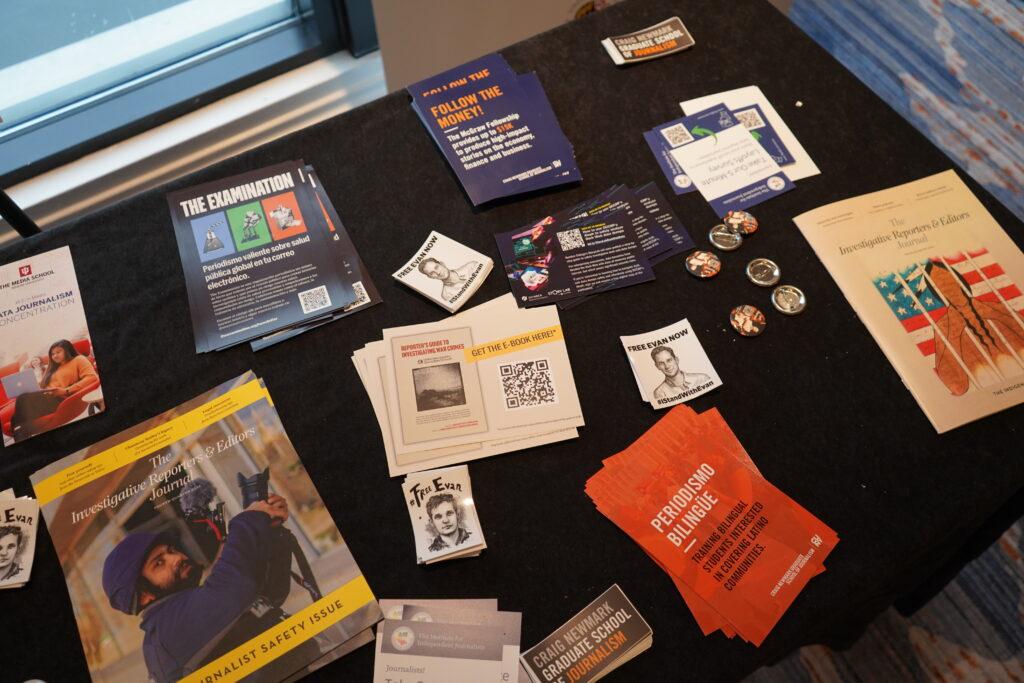
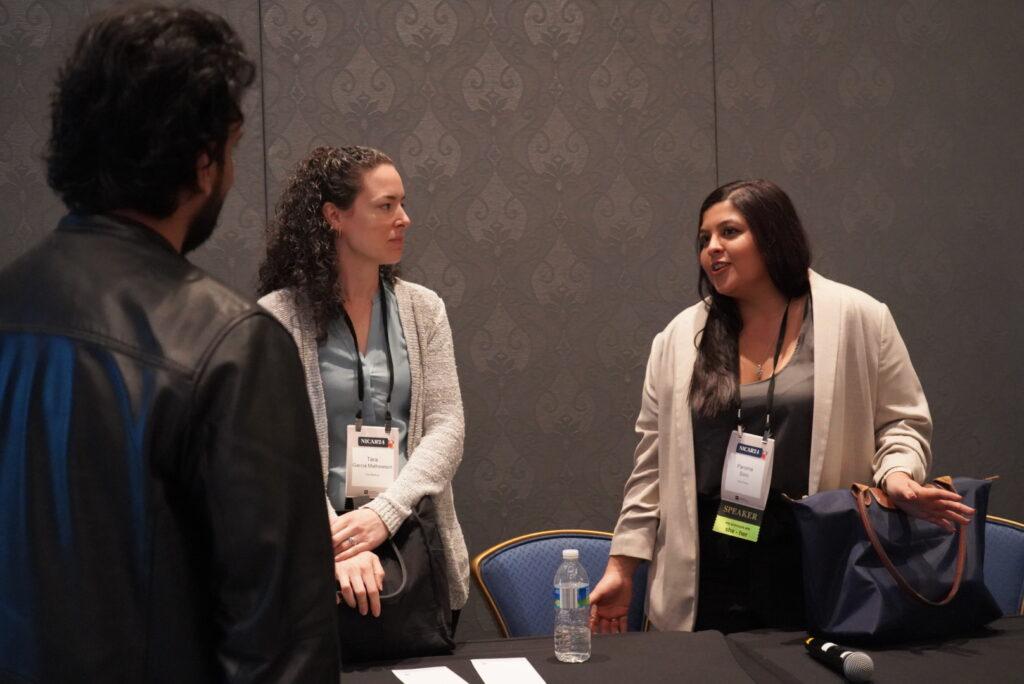
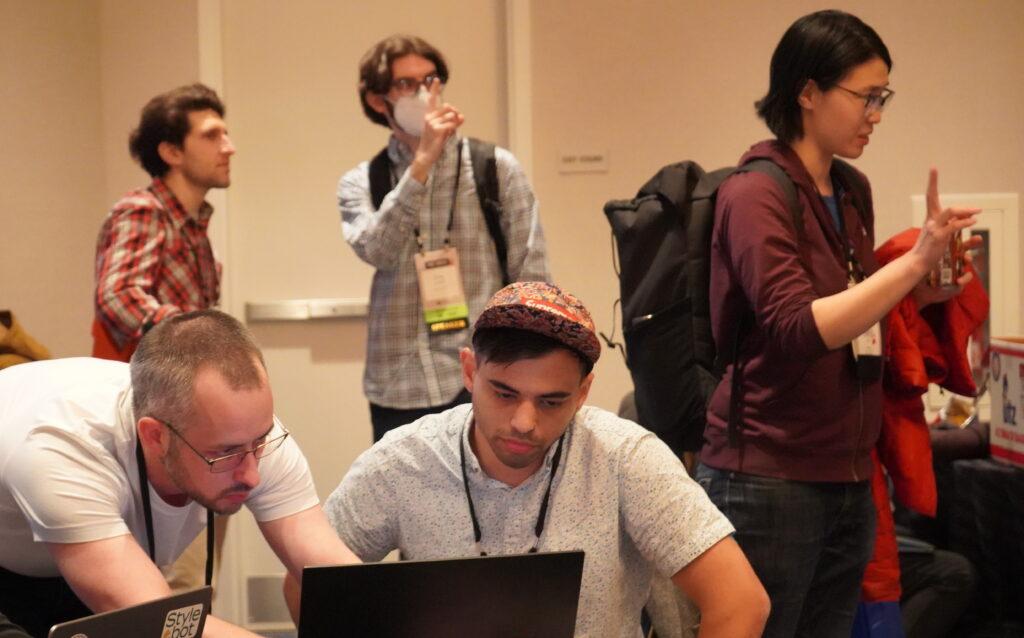
“We discussed how you can actually build those professional networks in a way that's not just your stereotypical networking, but more so in a way that’s really getting to know people,” Soni said. “Like building friendships, as opposed to one-off networking events.”
NICAR24 attendees took that to heart. Some people played board games and sang karaoke in the evenings after sessions. At “Code Buddies” on Saturday, about two dozen people got together to talk and get help on projects.
“It’s really great to see attendees want to hang out outside of the normally scheduled programming and want to be a part of the community,” Grandestaff said. “That is such an important thing for us as staff, to make everyone feel welcome and included.”
O’Dea, who was excited to reunite with her people, had to unexpectedly switch gears during the conference. On the second day of NICAR24, she received the news that she was being laid off from the Center for Public Integrity.
Almost immediately, her friends were waiting with hugs and drinks. They sang karaoke that night to let out the emotions. (O’Dea sang “Before he cheats” and “Put your records on.”)
It sounds strange, she admits, but the bad news didn’t ruin NICAR for her. She stayed, learned networked, taught sessions. Her Sunday morning class, “The 411 on 311,” was “the best that it has ever gone.”
“I just so happened to be in the one place where I could get the most support and most opportunities for what's coming next,” O’Dea said. “I consider myself incredibly fortunate that it happened the way that it did.”
As for the industry? Journalists like O’Dea and Soni are hanging on, despite the hardships. They feel drawn to the calling, and like other NICAR24 attendees, have a strong community to lean on.
“Immediately after it happened, I had this overwhelming feeling of, ‘Everything is going to be OK,’” O’Dea said. “I don't know exactly what's going to happen, but I'm going to figure this out. I always have figured it out.”
“Journalism will always be necessary,” Soni said. “It may change shape, maybe not every small newsroom is going to survive. But you also need it. … The media is still a very vital part of the American political and social landscape. ... I think it's worth holding on to.”
Want more NICAR24 content? See our full photo album here and review conference sessions here. We will continue adding tipsheets and session recordings in the coming days.
IRE has a Support a Journalist program to help members going through layoffs, furloughs or job terminations. Learn more about the program here.
Thank you for helping us advance our mission and support investigative journalism in 2023. Help us finish the year strong by contributing to our end-of-year giving campaign.
With our end-of-year giving campaign underway, join us in reviewing IRE’s many accomplishments to advance investigative journalism in 2023.
We put on three successful conferences, expanded training opportunities, advanced diversity initiatives and so much more. This year’s achievements — with support from members and donors — are a testament to IRE’s unwavering commitment to promoting excellence in investigative reporting, editing and data journalism.
“It's such a joy to reflect on the past year at IRE,” said Lauren Grandestaff, IRE’s Director of Content. “I'm so proud of all that we've accomplished as a small staff of 15. The dedication everyone has to providing thoughtful, inclusive and meaningful training, resources and support to journalists around the world gives me hope for 2024. We know there is still plenty of work to be done, and we're excited to continue bringing IRE to your cities, newsrooms, colleges and universities, and screens.“
IRE hosted NICAR23 (or “data prom,” as our training director Adam Rhodes calls it), in Nashville, Tennessee.
At IRE23, journalists from around the world came together for an engaging, four-day conference in Orlando, Florida. The annual IRE Awards ceremony allowed us to celebrate the best investigative journalism of 2022, in which our members shined the light of truth on hospitals, school districts, government institutions and more.
We also hosted the first AccessFest — our fully virtual fall conference previously known as the DBEI Symposium.
And thanks to the generous support of our sponsors and benefactors, we were able to help more than 150 journalists, students and educators attend our events at no cost this year.
We’re looking forward to NICAR24, March 7-10 in Baltimore, Maryland, and IRE24, June 20-23 in Anaheim, California! Stay tuned for AccessFest24 dates and registration details.
2023 was also a big year for IRE as an organization. We were thrilled to make changes and announce new initiatives to continue advancing our mission.
At the IRE annual conference, we renamed our prestigious Journalist of Color Investigative Reporting Fellowship in honor of the late Chauncey Bailey, a dedicated, community-driven journalist at The Oakland Post. Bailey was killed in 2007 in retaliation for his reporting.
On the data journalism side, we announced a major update to our signature Data Journalism Bootcamps. Beginning in 2024, we are offering a bootcamp focusing exclusively on Google Sheets and another focusing on the Python programming language.
As we plan for elections across the country in 2024, we kicked off a training series dedicated to election coverage. In November, we hosted “2024 Elections - where to begin?” Coming up in December is “Campaign Finance 101,” taught by Anna Massoglia of OpenSecrets and free for IRE members. Keep an eye out for more election-focused training opportunities and special monthly webinars free to IRE members throughout 2024!
Have an idea for us? Please reach out — we'd love to hear from you!
The field of investigative journalism is stronger when we work together. In 2023, we were proud to continue fostering partnerships with like-minded organizations and journalism associations.
IRE staff attended 12 conferences this year, including the AAJA, NAHJ and NABJ conferences, the National Native Media Conference in Winnipeg, Canada, and the Global Investigative Journalism Network conference in Gothenburg, Sweden.
We also worked with organizations such as the Education Writers Association, Trans Journalists Association and Trusting News (and many more!) to develop sessions and programming for our events.
For example, at IRE23, we worked with the Reporters Committee for Freedom of the Press to develop sessions on public records and media law. At AccessFest23, we hosted a compelling session with the National Center on Disability and Journalism on how newsrooms can better support journalists with disabilities.
The Indigenous Journalist Association and ICT News were some of the partners who contributed their expertise to the latest IRE Journal, a special edition in Indigenous news which we made available free to the public.
We believe this exchange of ideas and perspectives is crucial — both for our growth as an organization and for our members to excel in and out of their newsrooms.
As we look ahead to 2024, we are hopeful for the state of investigative journalism and inspired by our members’ dedication to helping us all live in a better, more informed world. As our executive director Diana Fuentes wrote in her introduction of the latest IRE Journal:
“At its best, journalism holds power accountable. It sheds light into dark places where injustice is trying to drag us down. Don’t give up!”
IRE was founded to bring journalists together to share skills and find community. This field comes with daunting challenges, but its impact is invaluable. We pledge to do our part by remaining steadfast in our commitment to improving the quality of journalism and upholding democracy.
All of this is possible with your help. Your support of IRE — whether it's through donations, your membership, event registration or volunteering your time and ideas — helps journalists across the world develop the skills and relationships they need to produce better investigative journalism.
Thank you for helping us provide training, resources and a community of support to investigative journalists in 2023!
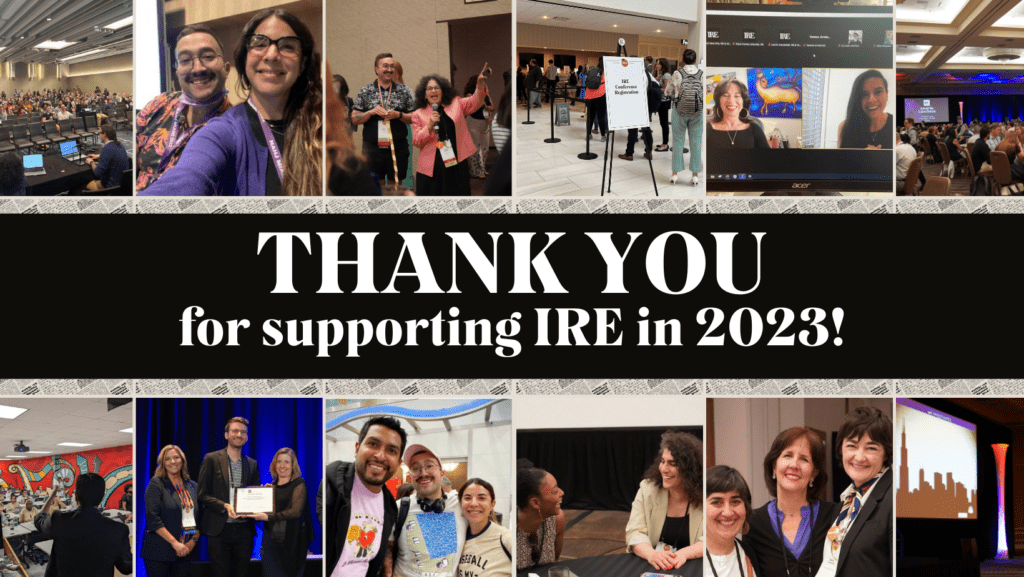
IRE successfully hosted the first-ever AccessFest, a virtual-by-design conference with an emphasis on DBEI programming.
Over the course of two-and-a-half days, our expert panelists led important conversations about diversifying newsrooms, building trust in communities, including more voices in coverage and becoming stronger advocates for ourselves as journalists.
And our members showed up engaged and ready to learn.
More than 300 people attended the virtual conference, which offered both DBEI programming and the traditional IRE conference training, Lauren Grandestaff, IRE’s director of content, said.
IRE members can access AccessFest23 session recordings here.
"We’re so excited to see the evolution and expansion of AccessFest," Grandestaff said. "Although it started as a smaller symposium (the DBEI Symposium) a few years ago, our rebranded fall virtual conference has morphed into IRE fulfilling the need for more accessible training — not only in diversity and inclusion spaces, but also in the investigative and data work that we’re so well-known for."
At IRE, we believe this training is crucial in our industry. Journalists need a critical mix of traditional technical skills and cultural competency awareness to truly make an impact, said Francisco Vara-Orta, IRE’s director of diversity and inclusion.
"We are in an era of journalism where many of our colleagues are seeking a sense of belonging in the industry," Vara-Orta said. "They are examining the role identity plays in work, prompted by heightened global discourse in politics and pop culture, and they are seeking ways to strengthen the work they do to meet this moment."
Maria Hinojosa, Pulitzer-Prize winning journalist and founder of Futuro Media, touched on these topics and shared her own story of resilience in the conference’s keynote conversation.
In a session called "Finding your voice," Jill Geisler taught attendees how to speak up on issues. In another session, panelists came together to discuss the nuances of covering stories about mixed race populations — and their own experiences of being mixed race in the industry. And with growing numbers of media workers facing anxiety, depression and burnout, Mar Cabra lent an ear and shared tips to improve mental health culture in newsrooms.
In the same spirit, we made an effort to collaborate with partner organizations to offer members informative, valuable and culturally relevant programming. We worked with the National Center on Disability and Journalism, Trans Journalists Association, Education Writers Association, Indigenous Journalist Association, Trusting News and other partners to organize sessions.
IRE members can access AccessFest23 session recordings here.
As a benefit to non-members in the journalism industry, we also opened up one special session to the general public for free online: "Examine staff diversity and bias as a tool for more nuanced coverage," hosted by Lynn Walsh, of Trusting News, and Letrell Crittendon, of American Press Institute.
This panel created important dialogue about who is represented in newsroom coverage (and staff) and who is left out. The recording of this session is available here:
Lynn Walsh of Trusting News and Letrell Crittendon of American Press Institute present "Examine staff diversity and bias as a tool for more nuanced coverage," at AccessFest23.
Better representation may mean looking locally for talent and collaborating with other newsrooms, Crittendon said. If you’re looking for new voices in coverage, maybe reporters should get a day to go out and meet people in the community — without the pressure of producing a story, Walsh recommended.
"By holding each other accountable, by listening to each other…we can have more fair, nuanced and better news coverage," Walsh said.
In addition to better news coverage and representation, we also hoped to emphasize accessibility at this conference. The virtual nature allowed us to welcome people from around the country (and the world!) and include folks who may have wanted to skip the travel and accommodations that come with attending an in-person event.
Though it was our first official AccessFest, this conference is just one part of our broader mission to expand investigative training resources to people traditionally underrepresented in the field. In line with this goal, we launched IRE Guides at AccessFest23. Guides is an IRE website offering free online resources, educational materials and more. It’s open to anyone interested in investigative journalism. https://guides.ire.org
Here’s what some of our attendees had to say:
After an exciting first year, we hope AccessFest will reach even more people and expand access to investigative journalism in the years to come.
"We’ve learned so much in the last few years with the DBEI Symposium and now AccessFest," Grandestaff said. "We look forward to the opportunity to grow with the needs of the industry and our membership."
Investigative Reporters and Editors concluded another successful IRE Conference, June 22-25 in Orlando, Florida.
While we were in the theme park capital of the world, sources say IRE23 was just as thrilling: “THIS is like Disney (World) to me,” University of Missouri student Claudia Levens said.
We welcomed more than 1,300 conference attendees and organized more than 200 panel discussions, classes and networking sessions over the four-day conference at the Renaissance Orlando at SeaWorld.
We made new friends and reunited with old ones. From networking sessions and mentorship meetings, to the random run-ins with former colleagues, editors and professors, IRE23 attendees had much to reflect, reminisce and talk about.
Lauren McGaughy, investigative reporter at Dallas Morning News, and Riley Bunch, city hall reporter at The Atlanta Journal Constitution, found the conference inspiring.
“Getting a little break from work and getting to learn, which we don’t really get time off to do a lot anymore as working journalists, has been very fulfilling,” McGaughy said. “It’s great to catch up with people from the last several papers I’ve worked at and see what work they’re doing now. It’s very exciting.”
“It’s very easy in our industry to get discouraged about what you’re doing,” Bunch said. “But then when you’re surrounded by journalists who are doing amazing work despite any challenges they might have in their newsroom or on their beats, it reinvigorates you to want to be in the field and pursue stories that you want to pursue.”
We met cute dogs. We had some fun on TikTok.
We drank a lot of coffee and got lost on the way to several sessions. We treasured meeting our journalism idols in real life, and we heard the words “I know you from Twitter” more than once.
We shared business cards and laughs. We were moved to tears.
Bob Segall, investigative reporter at WTHR-TV in Indianapolis, shared this scene from Boyd Huppert’s master class, “It’s just video… Until a storyteller creates an experience.”
“Does YOUR industry conference move you to tears? The line of attendees waiting to speak with @BoydHuppert after his epic writing seminar is out the door,” Segall tweeted. “At the front of the line, Boyd is giving a comforting hug. The power of finding the right words is overwhelming.”
And just a week after the conference, journalists including Nicholas Florko of Stat News and John Bedell of WHIO-TV are already using the skills they learned at IRE23.
“The fact that I have now run a Python script and used Tabula in one day, despite not knowing what either of those were last week, is proof enough that everyone should go to the IRE conference at least once in their career,” Florko shared on Twitter.
Did you come to Orlando but miss a speaker you really wanted to hear? Don't worry. We've got you covered. Accessing speaker's presentation slides and supplements in the IRE Resource Center is a perk of IRE membership. Not every session at IRE23 will have additional materials, and not every session was recorded (audio coming soon).
Speakers, if you have not done so already, please send your tipsheets and other materials to tipsheets@ire.org. IRE23 materials received so far are already online.
At the IRE23 awards luncheon, we celebrated the best investigative journalism of 2022 and congratulated the IRE Award winners and finalists across 19 categories — selected out of more than 400 entries.
We honored late Las Vegas Review-Journal investigative reporter Jeff German, posthumously awarding him the IRE Don Bolles Medal. German was killed at his home in September 2022; a county official who was the subject of German’s reporting has been charged with murder in his death.
Three of German’s colleagues, Rhonda Prast, Briana Erickson and Art Kane, delivered a powerful joint keynote address about him and the continuation of his work.
“When you kill a reporter, you don’t kill the story,” Erickson said.
She urged attendees to remember German “for the impactful work he did, and not for the heinous way he was killed.” German was best known for his relentless dedication to uncovering government corruption and exposing the misdeeds of Sin City’s notorious mob figures.
Also at the awards luncheon, IRE proudly announced the organization has named its Journalist of Color Investigative Reporting Fellowship in honor of Chauncey Bailey, a respected journalist who was covering his community of Oakland, California, when he was murdered in August 2007. His sister, Lorelei Waqia, and Bob Butler and Thomas Peele of The Chauncey Bailey Project were recognized at the ceremony.
And we inducted the first two honorees into the new IRE Ring of Honor. This fundraising initiative honors IRE members who have made significant contributions to the organization and to the field of investigative journalism. The first inductees are IRE legends: the late David Donald of Investigative Reporting Workshop at American University and the late Tom Torok of The Washington Post. Torok’s widow, Elena Torok, and their daughter Cece Lentini Torok accepted the plaque in his name. Colleague and former IRE board memberJennifer LaFleur received it on behalf of Donald’s family.
Another highlight of the IRE23 awards luncheon was the presentation of the annual Golden Padlock Award, the dubious “honor” recognizing the most secretive government agencies in the United States. Staunchly blocking the release of internal emails about a growing public health risk involving nitrate pollution earned Nebraska’s Department of Environment & Energy the 2023 Golden Padlock Award.
This year’s conference helped foster IRE’s commitment to diversity, equity and inclusion.
IRE hosted several Spanish-language sessions for the first time, featuring panel discussions with speakers and personalized one-on-one feedback sessions. We also hosted panels on how to investigate LGBTQ+ issues in the legal system and how to report on the anti-trans legislation across the country.
Krystal Nurse, diversity stories reporter at Lansing State Journal, was excited to attend these sessions, especially with the current political climate.
“I want to know how (in) my reporting, how I can help demystify a lot of the rhetoric behind the LGBTQ+ community and the stuff that’s trying to damage them,” Nurse said.
In the course of sessions at IRE23, journalists also talked about mental health, a theme important now more than ever.
An IRE23 showcase panel focused on the Uvalde school shooting and the lessons learned from covering tragedy. This emotional session featured Kimberly Rubio, a journalist in Uvalde, whose 10-year-old daughter Lexi was killed in the mass shooting. With the rush to break news and get the story, she reminded journalists there are real people on the other side of the camera.
"Always remember why you got into this field,” Rubio said.
Bruce Shapiro, executive director of the Dart Center for Journalism and Trauma, shared guidance on interviewing people with trauma. Journalists can be sensitive by being extra transparent in the reporting process, spending time with sources and going the extra mile to get permission.
“We need to understand that every trauma survivor is someone who has lost a huge sense of agency, of control,” Shapiro said.
At the panel “Finding balance: How to manage stress at work at home,” Zack Newman of KUSA-TV, independent journalist Peter Nickeas and Neena Satija of the Houston Chronicle, discussed tips for dealing with trauma as reporters.
Their tip sheet – which you can view here – highlights how trauma can build up over time and present in real time. One major piece of advice is to remove your entire self-worth from your profession; you are more than just a journalist.
Lastly, we have several new faces in leadership! We’re excited to have new members elected to the Board of Directors, including Hyuntaek “Tag” Lee, a journalist from South Korea, the first international member to serve on the board since 2014, and two new Contest Committee members. Soon after IRE23 concluded, the board convened to vote on officers for 2023-24. Brian M. Rosenthal of The New York Times is the new president.
The board is seeking volunteers for committees, where you can discuss your ideas and help to develop policy and set the future direction of our organization. If you’re interested, fill out this form by Friday, July 14. To find out more about what it’s like to serve on a committee, join us at a Q&A webinar Thursday, July 13, at 5 p.m. EDT.
IRE is able to host our annual conference and grow in our mission of training investigative journalists thanks to the generous support of our sponsors. We raised more than $230,000 for IRE23!
We very much appreciate our IRE23 sponsors: ABC News, ABC Owned Television Stations & ESPN, Arnold Ventures, Bloomberg, Knight Foundation, NBC News/NBCUniversal Local, CNN, Google Trends, Gray Television, ProPublica, Sinclair Broadcast Group, TEGNA Foundation, Houston Chronicle, Lumina Foundation, Napoli Management Group, National Association of Broadcasters, Scripps News, Shullman Fugate PLLC, Wallace House Center for Journalists, Central Florida Foundation, Cox Media Group, George Washington University, School of Media & Public Affairs, Global Investigative Journalism Network, Graham Media Group, Holland & Knight, Investigative Reporting Workshop/American University, McClatchy, Newspack, Reporters Committee for Freedom of the Press, Thomas & LoCicero
Thank you also to our members for attending and presenting at the conference. We look forward to seeing you at upcoming IRE events!
Find conference photos by Rashika Jaipuriar available via this public photo album in Google Drive. The photos have also been loaded to IRE's Facebook page as an album.
IRE offers training throughout the year. Check our event calendar for upcoming programming near you!
Upcoming conference dates and sites are confirmed. Join us online at AccessFest, October 12-14, an all-virtual conference focused on increased accessibility for high-quality training for all, and NICAR 2024 in Baltimore, March 7-10. IRE 2024 will be in Anaheim, California, June 20-23.
We also have fellowship and scholarship opportunities for journalists at all stages of their careers to attend IRE conferences and training events. We are now accepting applications for our Freelance Fellowship and Chauncey Bailey fellowship.

Looks like you haven't made a choice yet.